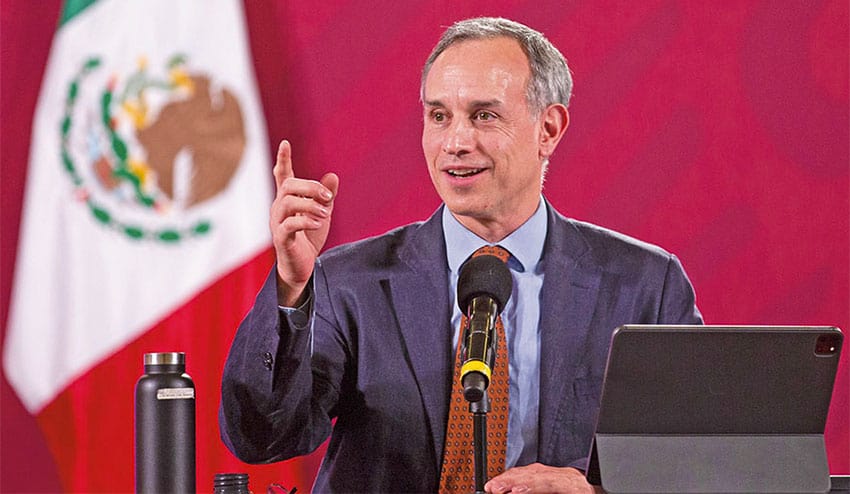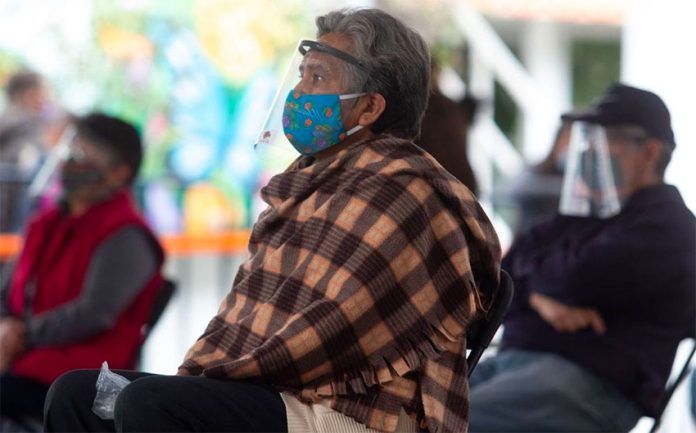The federal government website for the registration of seniors who want to receive a Covid-19 vaccine was overwhelmed by high demand on Tuesday, leaving many people unable to access it.
Deputy Health Minister Hugo López-Gatell said the site was swamped as soon as it was launched on Tuesday morning.
“That really pleases us, it speaks of the clarity the people of Mexico have about the importance of getting vaccinated against the SARS-CoV-2 virus and protecting oneself and protecting others from Covid-19,” he told reporters at the Health Ministry’s Tuesday night coronavirus press briefing.
López-Gatell said that 65,000 to 70,000 people per second were trying to register their details at one point and the system was saturated as a result.
The coronavirus point man said that work is being carried out to ensure that the website can cope with high volumes of traffic and advised people to be patient and continue trying to register. The site – mivacuna.salud.gob.mx – was functional on Wednesday morning.
The government’s information technology chief said Tuesday that it is intended to register seniors who live in medium-sized and large cities. César Vélez said that seniors who register will be subsequently contacted by government employees known as servants of the nation and given a vaccination appointment date and location.
López-Gatell said that seniors who live in parts of the country without internet access will be contacted by members of the government’s “roadrunner” vaccination brigades to inform them about when and where they can be vaccinated.
But it’s not only seniors who live outside large cities and towns who are likely to have trouble accessing the online vaccination platform.
More than 7.5 million seniors don’t have an internet connection in their home, according to the national statistics agency Inegi. The figure accounts for about half of the nation’s 15.4 million seniors.
Family members of the elderly are likely to be called upon to complete the registration process but some of them are also likely to face difficulties logging on. According to Inegi, 99 million people live in urban areas in Mexico and 36.9 million of them are not connected to the internet at home.
Of those who are unconnected, 44.1% live in just six states: México state, Puebla, Jalisco, Veracruz, Mexico City and Guanajuato.

More than 5.5 million people in México state, which ranks second in the country for coronavirus cases and Covid-19 deaths, are not connected to the internet at home, meaning that they will have to use mobile internet service, internet cafes or other alternatives to register themselves or their loved ones on the seniors’ vaccination website.
The poor, many of whom live in crowded conditions that have spurred the spread of the coronavirus, are likely to face the most difficulty in getting online.
However, López-Gatell was confident on Tuesday that a large number of senior citizens will be inoculated quickly once the process begins. He estimated that the 3 million older adults who live in rural areas will be vaccinated in just one week through the efforts of 20,000 vaccination brigades.
The government announced in early January that teams of a dozen people — four welfare officials, two healthcare workers, four military guards and two volunteers — would provide the vaccine to seniors at community centers and in their homes. At the time there were to be 10,000 such brigades. As of Tuesday, the number has been doubled.
Meanwhile, the immunization of health workers is proceeding slowly due to the lack of vaccines in the country. Only 2,027 shots of the Pfizer/BioNTech vaccine were administered on Tuesday, according to Health Ministry data.
More than 677,000 vaccines doses have been administered since the vaccination program began on December 24 but only 45,748 of those doses were second shots of the Pfizer vaccine. That means that the vast majority of health workers don’t have the fuller protection provided by the two shots, and many are unlikely to get a second dose within the recommended timeframe as Mexico waits for Pfizer to restart delivery of shipments following the upgrade of its production facility in Belgium.
The government expects to receive its next shipment of Pfizer vaccines sometime in the middle of February, and also anticipates receiving AstraZeneca/Oxford University, Sputnik V and CanSino Biologics vaccines this month.
The health regulator Cofepris granted emergency use authorization to the Sputnik vaccine, of which Mexico intends to purchase 24 million doses, on Tuesday.
López Obrador, currently sick with Covid-19, said last Friday that Mexico will receive 6 million vaccine doses this month and an additional 12 million in March. He predicted that all seniors who want to be immunized will receive at least one dose of a vaccine by the end of next month.
As preparations for a wider vaccine rollout ramp up, Mexico’s confirmed coronavirus case tally and Covid-19 death toll continue to grow.
The Health Ministry reported 4,384 new cases on Tuesday – the lowest daily tally since mid November – lifting the accumulated tally to just over 1.87 million. The death toll rose by 433 to 159,533, the third highest in the world behind those of the United States and Brazil.
Source: El Universal (sp), Milenio (sp), Forbes (sp)
